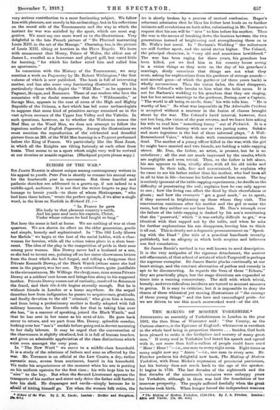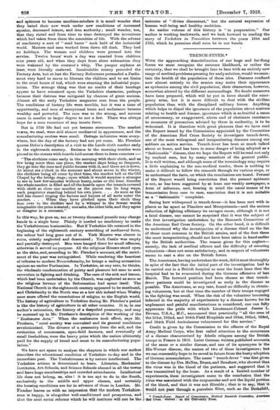THE MAKING OF MODERN YORKSHIRE.* ADDRESSING an assembly of Yorkshiremen
in London in the year 1682, the then Dean of Worcester said : " Our County, as the Curious observe, is the Epitome of England : whatsoever is excellent in the whole land being in proportion thereto . . . besides, God bath been pleased to make it the birthplace and nursery of many great men." If every soul in Yorkshire had heard his speech and agreed with it, not more than half-a-million of people could have cried " Hear ! Hear ! "—i.e., one man to every eight acres. Eight times as many might now say " Amen "—i.e., one man to every acre. Mr. Fletcher prefaces his delightful new book, The Making of Modern Yorkshire, with Dean Hicks's expression of provincial patriotism, but his history does not reach back to the ago of the speaker. It begins in 1750. The last decades of the eighteenth and the first decades of the nineteenth centuries were unhappy years for Yorkshire, although in them was laid the foundation of her immense prosperity. The people suffered fearfully when the great factories took birth. When hunger forced the independent weavers • The Making of Modern Yorkshire, 1740-1914. By J. 8. Fletcher. London: Allen and Unnin. 17.. ed. net.] and spinners to become machine-minders it is small wonder that they hated their new work under new conditions of increased squalor, decreased leisure, and iron authority ; small wonder, too, that they rioted and from time to time destroyed the inventions which had taken from them the amenities of life. With the advent of machinery a sort of " mad haste " took hold of the industrial world. Masters and men worked from dawn till dark. They had no holidays. The women and children were pressed into the service. Twelve hours' work a day was exacted from children nine years old, and when they slept from sheer exhaustion they were wakened by the overseer's whip. The pauper orphans at least. were literally enslaved. Incalculable misery preceded the Factory Acts, but at last the Factory Reformers persuaded a Parlia- ment very hard to move to liberate the children and to set limits to the cruel hours of toil, which were stunting the industrial popu- lation. The strange thing was that no marks of their bondage appear to have remained upon the Yorkshire character, perhaps because their distress was mitigated by chances of great success. Almost all the early Yorkshire magnates rose from the people. The conditions of factory life were terrible, but it was a time of opportunity, and men of exceptional brain and endurance became wealthy and powerful. The race was to the strong, and success came in smaller or larger degree to not a few. There was always hope for a man conscious of any innate force.
But in 1760 life had not yet become strenuous. The market - towns, we read, were still almost mediaeval in appearance, and the manufacturing centres were small. Cottage industries were every- where, but the day of the factory had not yet come. Mr. Fletcher quotes Defoe's description of a visit to the Leeds cloth market early in the eighteenth century. Betimes in the morning trestles were placed in the streets with boards laidacross them to form counters :—
" The clothiers come early in the morning with their cloth, and as few bring more than one piece, the market days being so frequent, they go into the inns and public-houses with it, and there set it down. At about six o'clock in the summer and about seven in the winter, the clothiers being all come by that time, the market bell at the Old Chapel by the bridge rings ; upon which would surprise a stranger to see in how few minutes without hurry, noise or tho least disorder the whole market is filled and all the boards upon the tressels covered with cloth so close one another as the pieces can lie long ways, each proprietor standing behind his own piece. . . . As soon as the bell has ceased ringing the factors and buyers of all sorts enter the market. . . . When they have pitched upon their cloth they lean over to the olothier and by a whisper in the fewest words imaginable the price is stated ; one asks, the other bids, and they agree or disagree in a moment."
In this way, he goes on, ten or twenty thousand pounds may change hands in a single hour. Plainly it needed no machinery to taake the Yorkshireman businesslike. But if Yorkshire life retained in the beginning of the eighteenth century something of mediaeval form, the colour had long gone out of it. York Minster was almost in ruins, utterly neglected and desecrated ; York Castle was empty and partially destroyed. Men were hanged there for small offences, otherwise it served no purpose. All the religious Houses stood open to the skies, and, according to Mr. Fletcher's account, all the merri- ment of the past was extinguished. While rendering the heartiest of tributes to modern Nonconformity, he brings a railing acouaation against an earlier Puritanism. In Yorkshire, at any rate, he thinks, the wholesale condemnation of gaiety and pleasure led men to seek recreation in fighting and drinking. The care of the sick and insane, which had been undertaken by the Church, was neglected as soon as the religious fervour of the Reformation had spent itself. The National Church in the eighteenth century appeared to be moribund, and Christianity in the North was at a low ebb indeed when Wesley once more offered the consolations of religion to the English world. The history of agriculture in Yorkshire during Mr. Fletcher's period is like the history of agriculture in all other counties. It is, in our author's estimation, the history of a despoiled peasantry, and may be summed up in Mr.' Prothero's description of the working of the " Enclosures Acts." When the enclosures took effect, says Mr. Prothero, " rural society was convulsed and its general conditions revolutionized. The divorce of a peasantry from the soil, and the extinction of commoners, open-field farmers, and eventually of small freeholders, were the heavy price which the nation ultimately paid for the supply of bread and meat to its manufacturing popu- lation."
We have not space to analyse the chapters in which our author describes the educational condition of Yorkshire to-day and in the immediate past. The Yorkshireman is by nature intellectual. The Yorkshire artisan is determined to learn. Libraries, Mechanics' Institutes, Art Schools, and Science Schools abound in all the towns and have huge memberships and crowded attendances. Intellectual life does not belong, as, alas ! it is too apt to do in the South, exclusively to the middle and upper classes, and certainly the housing conditions are far in advance of those in London. Mr. Fletcher leaves us with an impreakoti that the modern Yorkshire- man is happy, is altogether well-conditioned and prosperous, and that the next social reforms which he will institute will not be the
outcome of " divine discontent," but the natural expression of human well-being and healthy ambition.
An earlier volume of this history is " in preparation." Our author is working backwards, and we look forward to reading the story of Yorkshire in Transition between the years 1644 and 1760, which he promises shall soon be in our hands.











































 Previous page
Previous page